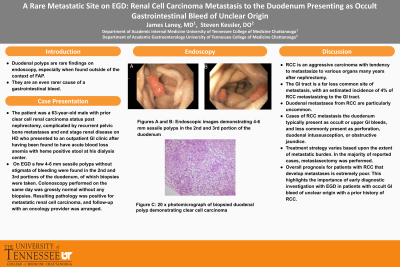Tuesday Poster Session
Category: GI Bleeding
P4200 - A Rare Metastatic Site on EGD: Renal Cell Carcinoma Metastasis to the Duodenum Presenting as Occult Gastrointestinal Bleed of Unclear Origin
Tuesday, October 29, 2024
10:30 AM - 4:00 PM ET
Location: Exhibit Hall E

Has Audio

James Laney, MD
University of Tennessee Health Science Center
Columbia, SC
Presenting Author(s)
James Laney, MD, Steven Kessler, DO
University of Tennessee Health Science Center, Chattanooga, TN
Introduction: Duodenal polyps are rare findings on endoscopy, especially when found outside of the context of familial adenomatous polyposis syndrome, and are an even rarer cause of a gastrointestinal bleed. One potential etiology of a duodenal polyp comes from the presence of metastatic disease. Our case here reported an incidence of an occult GI bleed in the setting of metastatic disease due to recurrent renal cell carcinoma (RCC).
Case Description/Methods: The patient was a 63 year old male with prior clear cell renal carcinoma with nephrectomy in 2008 and recurrent pelvic bone metastases beginning in 2014, with end stage renal disease on HD who presented to outpatient GI clinic after having been found to have acute blood loss anemia with heme positive stool at his dialysis center. He reported a history of dark stools and had attributed them to ongoing iron infusions he received with his HD therapy. He was referred to GI after a repeat hemoglobin level of 7.4 following infusion of 2 units of pRBC with HD. On EGD a few 4-6 mm sessile polyps without stigmata of bleeding were found in the 2nd and 3rd portions of the duodenum, of which biopsies were taken. Colonoscopy performed on the same day was grossly normal without any biopsies. Resulting pathology was positive for metastatic renal cell carcinoma, and follow-up with an oncology provider was arranged.
Discussion: RCC is known to be an aggressive form of carcinoma with tendency to metastasize to various organs many years after nephrectomy. The lungs, lymph nodes, bone, and liver are among the most common sites of metastasis for RC. The GI tract is a far less common site of metastasis, with an estimated incidence of 4% of RCC metastasizing to the GI tract. Duodenal metastases from RCC are particularly uncommon, with only a few reported cases available in English literature. Cases of RCC metastasis the duodenum typically present as occult or upper GI bleeds, and less commonly present as perforation, duodenal intussusception, or obstructive jaundice. Treatment strategy varies based upon the extent of metastatic burden. In the majority of reported cases, metastasectomy was performed. Some cases have been treated with pancreaticoduodenectomy which has demonstrated improved patient survival. Overall prognosis for patients with RCC that develop metastases is extremely poor. This highlights the importance of early diagnostic investigation with EGD in patients with occult GI bleed of unclear origin with a prior history of RCC.

Disclosures:
James Laney, MD, Steven Kessler, DO. P4200 - A Rare Metastatic Site on EGD: Renal Cell Carcinoma Metastasis to the Duodenum Presenting as Occult Gastrointestinal Bleed of Unclear Origin, ACG 2024 Annual Scientific Meeting Abstracts. Philadelphia, PA: American College of Gastroenterology.
University of Tennessee Health Science Center, Chattanooga, TN
Introduction: Duodenal polyps are rare findings on endoscopy, especially when found outside of the context of familial adenomatous polyposis syndrome, and are an even rarer cause of a gastrointestinal bleed. One potential etiology of a duodenal polyp comes from the presence of metastatic disease. Our case here reported an incidence of an occult GI bleed in the setting of metastatic disease due to recurrent renal cell carcinoma (RCC).
Case Description/Methods: The patient was a 63 year old male with prior clear cell renal carcinoma with nephrectomy in 2008 and recurrent pelvic bone metastases beginning in 2014, with end stage renal disease on HD who presented to outpatient GI clinic after having been found to have acute blood loss anemia with heme positive stool at his dialysis center. He reported a history of dark stools and had attributed them to ongoing iron infusions he received with his HD therapy. He was referred to GI after a repeat hemoglobin level of 7.4 following infusion of 2 units of pRBC with HD. On EGD a few 4-6 mm sessile polyps without stigmata of bleeding were found in the 2nd and 3rd portions of the duodenum, of which biopsies were taken. Colonoscopy performed on the same day was grossly normal without any biopsies. Resulting pathology was positive for metastatic renal cell carcinoma, and follow-up with an oncology provider was arranged.
Discussion: RCC is known to be an aggressive form of carcinoma with tendency to metastasize to various organs many years after nephrectomy. The lungs, lymph nodes, bone, and liver are among the most common sites of metastasis for RC. The GI tract is a far less common site of metastasis, with an estimated incidence of 4% of RCC metastasizing to the GI tract. Duodenal metastases from RCC are particularly uncommon, with only a few reported cases available in English literature. Cases of RCC metastasis the duodenum typically present as occult or upper GI bleeds, and less commonly present as perforation, duodenal intussusception, or obstructive jaundice. Treatment strategy varies based upon the extent of metastatic burden. In the majority of reported cases, metastasectomy was performed. Some cases have been treated with pancreaticoduodenectomy which has demonstrated improved patient survival. Overall prognosis for patients with RCC that develop metastases is extremely poor. This highlights the importance of early diagnostic investigation with EGD in patients with occult GI bleed of unclear origin with a prior history of RCC.

Figure: Figure A and B: Endoscopic images demonstrating 4-6 mm sessile polyps in the 2nd and 3rd portion of the duodenum
Disclosures:
James Laney indicated no relevant financial relationships.
Steven Kessler indicated no relevant financial relationships.
James Laney, MD, Steven Kessler, DO. P4200 - A Rare Metastatic Site on EGD: Renal Cell Carcinoma Metastasis to the Duodenum Presenting as Occult Gastrointestinal Bleed of Unclear Origin, ACG 2024 Annual Scientific Meeting Abstracts. Philadelphia, PA: American College of Gastroenterology.
